Why is Astrology Relevant to your Live?
Astrology is an idea as old as time itself. It is a technology of time, a significant component of our past, present, and future existence. And thus it is relevant in today’s era of technology and science, with its many ideas and concepts.
Astrology is used extensively to describe the characteristics of persons and events and anticipate the most auspicious times for carrying out every type of activity, as well as foretell future occurrences, and it may also be applied to remove any sort of misfortune associated with adverse planetary configurations.
Since ancient times, the idea that planetary bodies in the solar system might give a glimpse of the future has attracted humans. Our interest in astrology ranges from a casual check at the newspaper’s zodiac signs section to making life-altering choices on marriage, finances, and careers, as well as health forecasts.
Numerous successful individuals are known to have consulted astrologers while making important life choices. Wall Street brokers uses financial astrology daily.
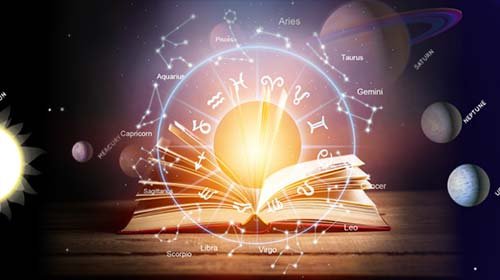
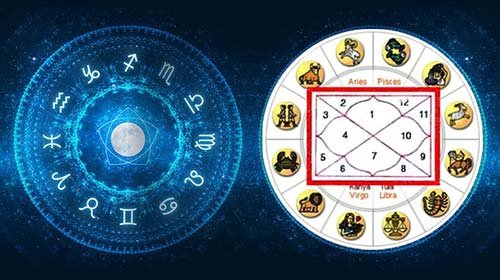
Astrology derives from two Greek words: Astro, which means star, and Logos, which means logic or reason. The philosophy and law reflected by the stars or planets are denoted by astrology. It is the study of the correlation between the movement of the planets and stars and our daily lives.
Jyotisha (from Sanskrit jyotia, from jyót “light, celestial body” and ish – from Isvara or God) is the ancient Hindu system of astrology, often known as Indian astrology and, more recently, Vedic astrology. It is one of the ancillary disciplines related to the study of the Vedas in Hinduism.
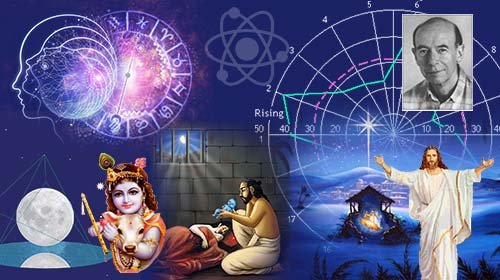
Astrology has been regarded as a science for the most part of human history, and finally received scientific validation in the last century as a result of numerous statistical studies published by numerous researchers, most notably by French scientist Michel Gauquelin, from the University of Paris.
Essentially, it is a science of time. Every moment in time have a unique meaning, quality, or significance. By being born at a specific moment according to the astrological calendar, we get this attribute. Our individual horoscope serves as a blueprint for our journey through time on Earth.
A birth chart is entirely based on astronomy, and its interpretation is a combination of fundamental astronomical laws and scientifically proven correlated astrological traits that have been observed throughout history and statistically proven. We have to take in mind, however, that astrology same as medicine and other historical scientific disciplines, are not exact sciences. No astrologer or medical doctor can always predict events with 100% accuracy.
Nonetheless, with a significant degree of precision, through astrology an important variety of character attitudes, mental and physical dispositions, and even the sorting out of life events in career, relationships, and all spheres of life can be inferred, if not exactly described. Timings for life and death included.
Mark Twain, the famous American writer, was born during a Halley’s Comet visit and died 75 years later when the same comet returned. Jesus Christ was born exactly beneath the Star of Bethlehem. Both Lord Krishna’s ascendant and natal Moon were located in the Rohini nakshatra at his birth. This nakshatra bestowed upon him the charisma to captivate those who would otherwise not listen.
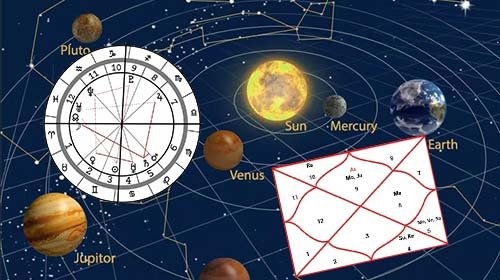
A birth chart unveils our potential and life goals. The birth chart’s symbols can be decoded. All perspectives in the entire chart are connected to the current planetary movements. Therefore, astrology has a significant impact on our lives.
Even though we are unaware of it, the various lunar and planetary movements and alignments affect our minds and emotions. The planetary positions at the time of our birth in the astrological chart cannot be compared to any other time. This study demonstrates how one or two planets significantly impact our lives at a given time. The outcome may be positive or negative, but these comparisons highlight the alteration in our lives, dispositions, and responses to events. This field of study of these correlations pertains to astrology only.
The planetary movements of those with whom we frequently interact, such as our parents, spouse, children, relatives, friends, coworkers, superiors, and so on, not only affect us, but they also affect them. Thus, astrology has an impact on these people just as much as it does on us. Everything is interconnected.
In many instances, people begin to believe in astrology during times of natural disasters. Why? The word disaster is derived from the ancient Greek pejorative prefix Dus or “bad” and Aster or “star.” The origin of the word disaster (“bad star” in Greek) is an astrological sense of calamity attributed to the arrangement of planets. This also provides a logical explanation for how planetary motions affect our lives and the world we live in.
The continuous movement of the planets of the solar system in relation to our natal chart is related to multiple psychological, physical, and spiritual events in the same way that sunrise and sunset mark our biological and daily schedules, regulating the production of hormones in our body, or the great variety of effects observed on our ecosystem due to the phases of the moon, or how certain planetary conjunctions have been related to historical events.
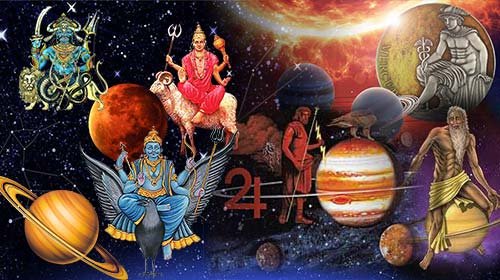
Since ancient times, the planets were thought to be Gods who oversaw human life on Earth as well as all major historical events that occurred one after the other and the names of the Solar System’s major planets were given to these deities from Roman mythology in the west or Vedic scriptures in the east. Thus, Jupiter, the largest planet, was considered the father of all gods and men, while Saturn ruled time, seasons, and crops, and Neptune was the god of the oceans and all marine creatures. However, talking about planetary influence is nothing more than a traditional habit of referring to the correlation between celestial and terrestrial events in a simple and habitual (not literal) way.
One of the most significant advances in the development of modern astrology has been the principle of synchronicity (Jung), rather than causation. It is a rejection of the old Ptolemaic model of “celestial influences” as obsolete and a return to a livelier astrology on planetary alignments and their meanings, rather than on their “causes”. Thus, we refer to the effect of planets on our lives as a reflection of our inner and outer conditions. It does not negate their divine connection but rather clarifies the correlation in a more comprehensible manner.
The term “synchronicity” was coined and first used publicly in the early twentieth century by the Swiss physician Carl Gustav Jung, an astrological researcher, to refer to events that appear to be connected but cannot be explained by other mechanistic rules other than synchronicity. In Jung’s theory of synchronicity, time and space become relative principles which, under certain conditions, can be transcended in the occurrence of a ‘meaningful coincidence’. In a nutshell, synchronous events are merely reflections of concurrent and parallel events that transcend the mechanical model of cause and effect, which is conceptualized in duality, in order to move to the non-duality concept of as above, so below.
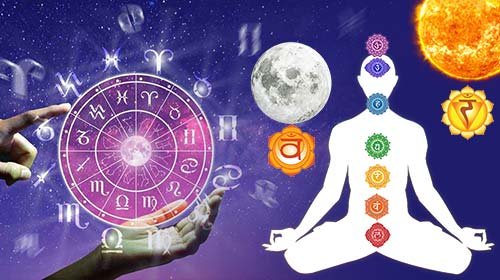
Every individual’s astrological birth chart is independent of personal opinion. Many times in our lives, despite knowing that comparison is unfavorable, we fall into the comparison mode of thought. Occasionally, we wonder, “Why am I doing this?” What is taking place in my life? Why must I observe this? And so forth. Here, astrology introduces a new perspective into our lives. Astrology does not imply that we must rely solely on fate. It emphasizes our karma and actions because, according to astrology, “today’s karma is tomorrow’s fate.”
Astrology illuminates the path known as life, and it is entirely up to us whether or not we wish to follow it. When we encounter a difficult period in our lives, astrology teaches us how to make the most of these experiences for our own benefit. Astrology is the link between the past, present, and future. It has no laws for caste, culture, religion, gender, or nation. It simply pertains to the fundamental functioning of our daily lives.
Furthermore, astrology relates to our energetic system or chakras. Each planet affects or correlates with a specific chakra and its energetic field, as a one more reflection of the oneness of the universe. Mars influences Muladhara or the root chakra while the Moon relates to Swadhisthana or the sacral chakra, the Sun correlates with the Manipura or Solar Plexus chakra and the same with each chakra of the human system.
By praying to the planets associated with specific chakras that are out of balance, we accept these chakras’ lessons and progress in life. Thus, the planets are the teachers who guide us through this school of life and help us to realize our higher selves by releasing the energy of our chakras.
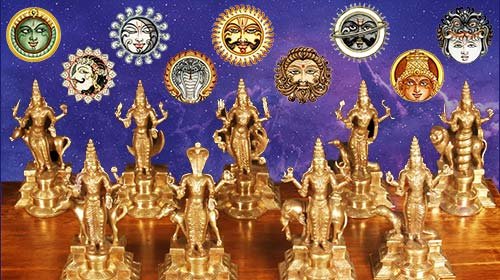
Hindus have had their own version of astronomy since very ancient times, just as many other ancient civilizations did. Hindu astronomy is based on the arrangement of the nine planets and their collective influence on the world and each individual. Hindus believe that the possibilities and potentials of a person’s life and energies are determined well in advance based on the location of these planets at the time of his birth. Astronomy and astrology were interchangeable terms since their beginning.
They are denominated Surya or the Sun god, Chandra or the Moon god, Mangala or planet Mars, Budha for Mercury, Brihaspathi for Jupiter, Sukra for Venus, Sani for Saturn, Rahu for the North Node and Ketu for the South Node. Some of the deities featured in the Navagrahas are actually Vedic gods, as evidenced by their names. Probably, the idea of the Navagrahas is a later Vedic concept. Brihaspati, also known as Brahmanaspati, is the largest of all the planets and is praised in numerous hymns of the Rigveda.
Although they are called planets, the Navagrahas are not actual planets in the modern sense. They are deities within the “cosmic person” who also exist in the microcosm. Their positions in the body and in the world influence both the universal and individual course of events.
The Prague Astronomical Clock (installed in 1410) with the signs of the Astrological Zodiac.

Chakra Yog’s Knowledge base has evolved from Advaita Vedanta teachings and from Bhagwat Gita’s four paths to Union.
Connect With Us

Chakra Yog,
C-309, Neelkanth Business Park, Nathani Road, Behind Vidyavihar Railway Station, Vidyavihar (W),
Mumbai – 400086, Maharashtra, India.

Open: Monday – Friday: 8.00am – 7.00pm
Close: Saturday – Sunday – Holiday



